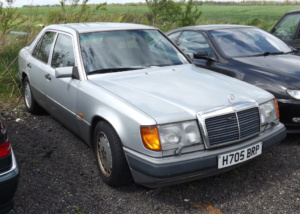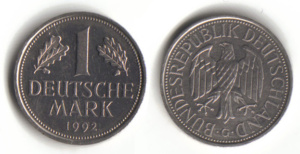This day in history: July 1, 1990: Deutsche Mark becomes official currency of unified Germany
We take a look back at “This day in history” within the world of FX taking a journey through annuls of time to look at the various groundbreaking developments that continue to take place in our fascinating industry.

At the end of World War Two, the possibility of an economic union between European nations was not even a remote consideration for what was an impoverished continent, divided between the ideologies of the Western free world and the single-party socialist states of the East, with a wall and impenetrable checkpoint ensuring that the Daimlers could not mix with the Trabants.
Business ideology was divided, and although both Eastern Europe and Western Europe were war-torn, weary and in many cases required rebuilding from an economic, architectural and societal perspective, both sides operated under completely different monetary and administrative methods.

In 1948, West Germany (Federal Republic of Germany) introduced a new currency, the Deutsche Mark, replacing the Reichsmark, and in Soviet-aligned East Germany (German Democratic Republic), the East German Mark (Mark der DDR, or ‘Ostmark’) went into circulation.
During the year 1948, economic reforms were made, which were intended to resolve the control of prices and salaries which had been in place since the 1930s, and although money supply had been plentiful, it meant that a number of citizen had accrued large paper assets and that there was a complete misalignment between official prices of goods and services compared to salaries.
As a result, there was a huge unofficial market for products and services across Germany, effectively a black market economy in which more than half of all transactions in all products and services across Germany were taking place on an unofficial market.
The solution was very simple, and involved replacing the old currency with the newly minted Deutsche Mark with a rate set at one Deutsche Mark to ten Reichsmark, eradicating the vast majority of government debt, however private savings were also completely diminished as 90% evaporated.
It was not until the disbanding of the Soviet Union that Germany had a single currency.
On this day, July 1, 1990, accompanied by the Utopian words of German rock band The Scorpions as they sang about the demise of communism in East Germany in “The Wind of Change”, the newly unified Germany adopted the Deutsche Mark as its currency, extending the free market economy of the West across Checkpoint Charlie into the East.

Prior to the reunification, capital control laws were very strict and each East German citizen wishing to go to West Germany had to ask for permission from the government, and if granted, was allowed 100 Deutsche Marks in cash, with huge disagreements between the Deutsche Bundesbank and the German government with regard to exchange rates.
Whilst the reunification of Germany was anticipated by citizens of East Berlin, many Western European nations opposed the unification of Germany and attempted to influence the Soviet Union to put a stop to it until France cut a deal with West Germany, the terms of which required agreement not to oppose the unification.
During its lifetime as the currency for unified Germany which spanned from July 1, 1990 until Germany adopted the Euro on January 1, 2002, the Deutsche Mark was one of the world’s strongest currencies, enjoying long term stability due to the monetary policy of the Bundesbank, Germany’s central bank.
Between July 1, 1990 and July 1, 1991, East German coins in denominations up to 50 pfennigs continued to circulate as Deutsche Mark coins at their face value, owing to a temporary shortage of small coins. These coins were legal tender only in the territory of the former East Germany.
Just as pounds are known as ‘quid’ in England, and dollars as ‘Greenbacks’ in the US and ‘loonies’ in Canada, the Mark also had its colloquial nicknames.
Sub-denominations of the Deutsche Mark, which were called pfennig (penny) were often referred to as the ‘groschen’, which rather amusingly translates into ‘groat’.
The word groat was originally an ancient measurement that meant the old English silver coin which was worth four English pennies back in 1272, however because of its use as a nickname for German pfennigs, the word ‘groat’ soon became used as a term of derision for European currencies by British Eurosceptics as a means of mocking the currencies when compared to the British pound, with “we don’t want their groats” being a bar-room phrase for those against any European drive toward replacing the Pound with a single European currency.

A nickname that has transferred itself to the same denomination in Euros is “Zwickl” which is a diminutive form of Zwei, literally “Two” in German, which was used for the 2 Mark coin, and now is used to refer to the 2 Euro coin.
With the newly unified Germany and its all-encompassing currency came new technology.
During that year, the Bundesbank made steps toward putting paid to increasing advances in forgery technology. A new series of banknotes was launched with very complex depictions of German artists and scientists together with symbols and tools of their trade to make it harder to counterfeit the notes.
This series added a 200-mark denomination, to decrease the use of 100-mark banknotes, which made up 54% of all circulating banknotes, and to fill the gap between the DM 100 and DM 500 denominations.
This is quite a poignant anniversary as the geopolitical magnitude of the demolition of the Berlin Wall was equal fuel to volatile currency markets as last week’s referendum by the UK which resulted in a vote to leave the European Union.









